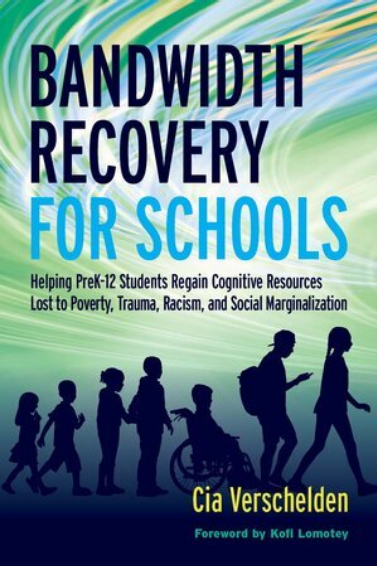Bandwidth in PreK-12 Schools
“To solve a problem, you need to ask the right questions. In Bandwidth Recovery for Schools, Cia Verschelden is asking the right questions about the impact of poverty, trauma, racism and social marginalization on school children, their families, and their teachers. Most importantly, she is providing much-needed answers that can help students thrive even when facing adversity. Every educator should read this book!” —BEVERLY DANIEL TATUM, Ph.D., Author, Why Are All the Black Kids Sitting Together in the Cafeteria? and Other Conversations about Race
Bandwidth Recovery 2nd ed (2024)…
Bandwidth Recovery was first published in 2017, just as I completed my term as President of Morehouse College. My only regret is that it was not published sooner, because I would have been armed with the perfect vocabulary and playbook for improving the living, learning and working environments for all students, faculty, and staff. It is now axiomatic – victims of systemic marginalization and “othering” pay a much higher bandwidth tax than most. Thus, any campus leaders who are determined to position everyone to optimize their skill sets, mindsets, and toolsets must read this book. And without even mentioning the current controversies, Verschelden provides the best way to clarify the value proposition of all offices devoted to diversity, equity and inclusion – that is, to lower the bandwidth taxes and restore the cognitive capacities of those with academic and life profiles that most warrant it. Rather than controversial, that is America at her best!
John Silvanus Wilson, Jr., Managing Director of the Open Leadership Project at the MIT Media Lab, former President of Morehouse College, USA, and Author of Hope and Healing: Black Colleges and the Future of American Democracy.
To order books at a bit of a discount, look here, and to request an exam copy if you are considering using the book for a class here.
Helping Students Reclaim Cognitive Resources Lost to Poverty, Racism, trauma, and other "Differentisms"
In the United States today, people who live with persistent economic insecurity and members of non-majority groups, systematically experience conditions in their lives that result in chronic stress and, therefore, decreased physical and mental health and social and economic opportunity. The costs of the many kinds of scarcity in their lives – money, health, respect, safety, affirmation, choices, belonging – is seriously reduced “mental bandwidth,” the cognitive capacity and emotional resources needed to make good decisions, learn in school, maintain healthy relationships, work, and more. Children who are operating with depleted mental bandwidth are less able to succeed in school, starting in early childhood, and are much less likely to learn effectively from pre-K through high school and to get in and through college. These children and young people, in general, have the same mental capacity as their more advantageously positioned peers; what they need is for us to create learning environments, starting in early-childhood education, in which we can help them gain back some of the bandwidth they loose to poverty, racism, trauma, and other "differentisms."
invitation
If you are involved in early childhood, elementary, high school, or post-secondary education, you are aware of the persistent academic opportunity and social development gaps between economically-secure white students and students who come from poor/low-income families and who are members of non-majority groups by race/ethnicity, sexual orientation, gender identity, ability, and other kinds of differences that often result in exclusion and a deficit approach to education. The purpose of this web site is to share our experiences with creating learning environments in which all children and students of all ages can learn and develop to their full potentials.
perspective
In some ways, the ideas proposed on this site are not new. The perspectives of "bandwidth depletion" and "bandwidth recovery" are just new ways to look at how some students thrive and others struggle. They are ways to understand that there are realities in the lives of students that result in their having limited cognitive capacity to devote to learning and development AND that there are things we can do as teachers and leaders in schools that will help children, youth, and college students recover enough mental bandwidth so they can reach the potential of their individual abilities in spite of the societal realities that undermine them.


